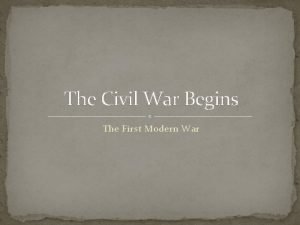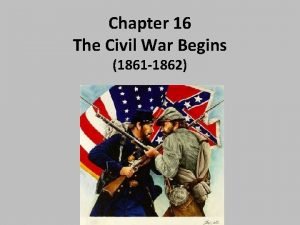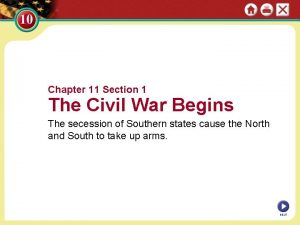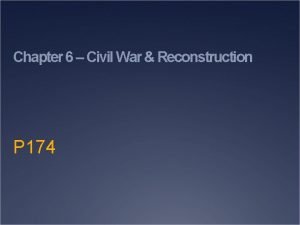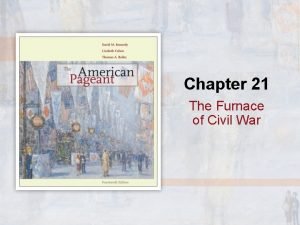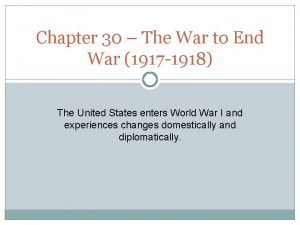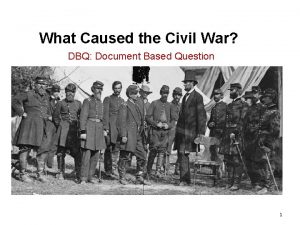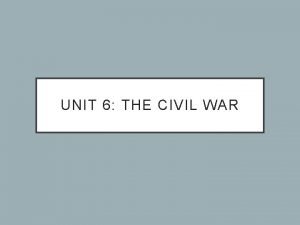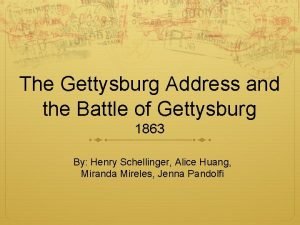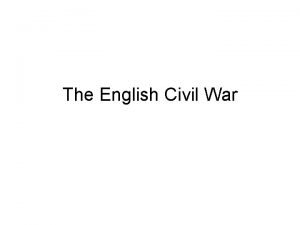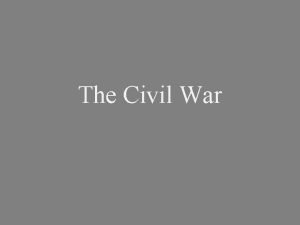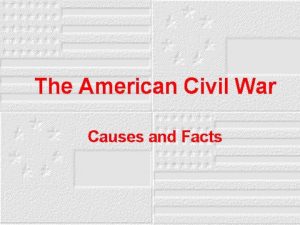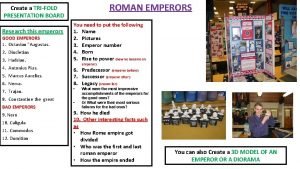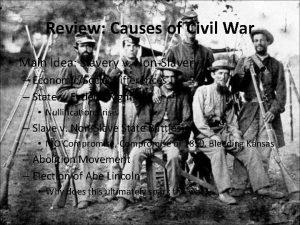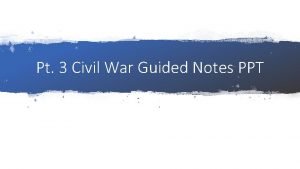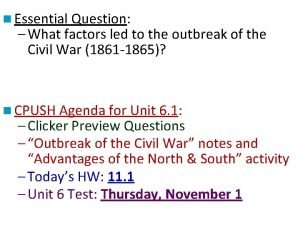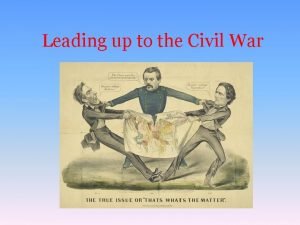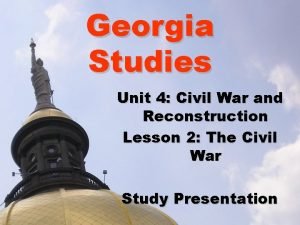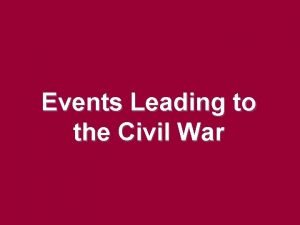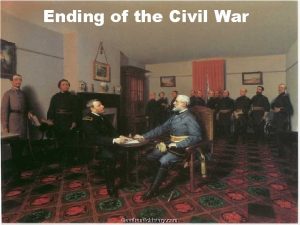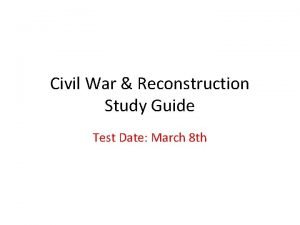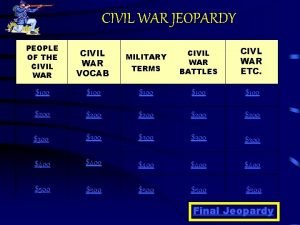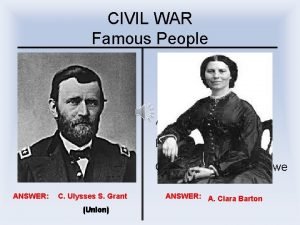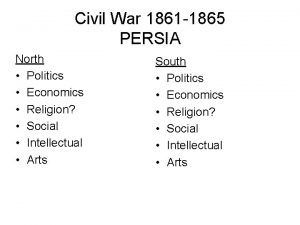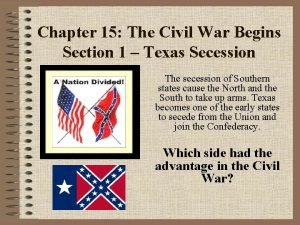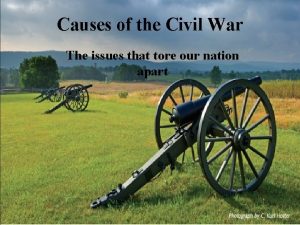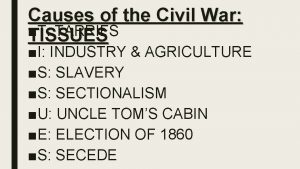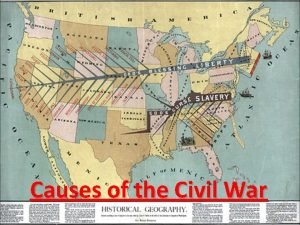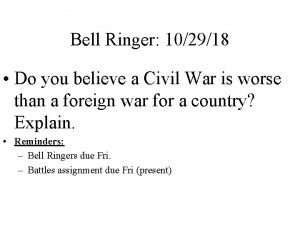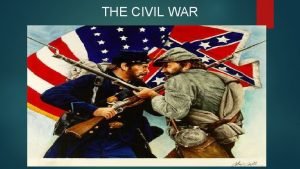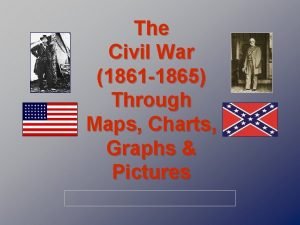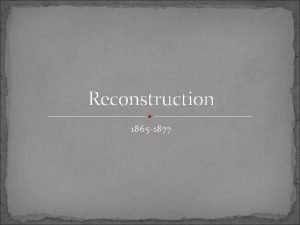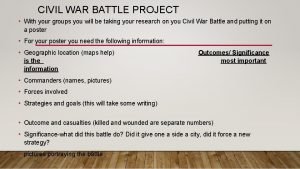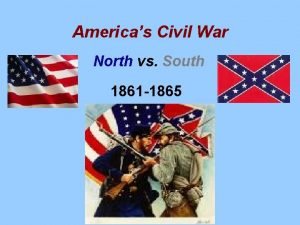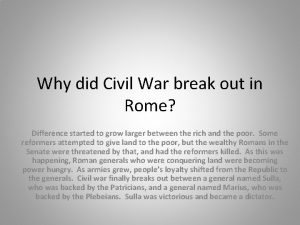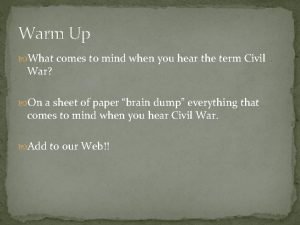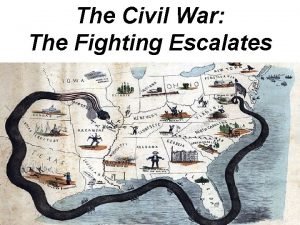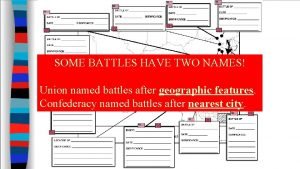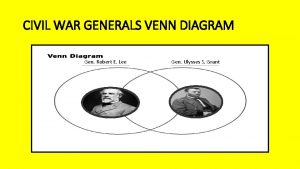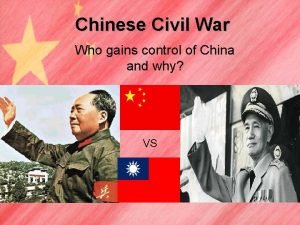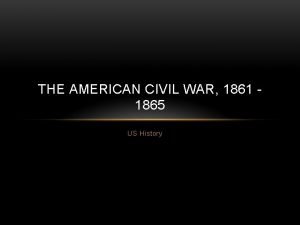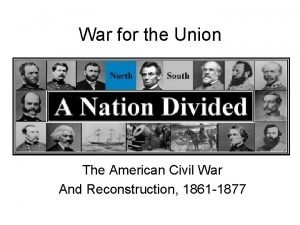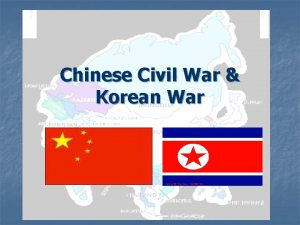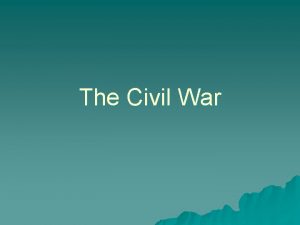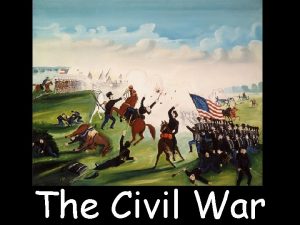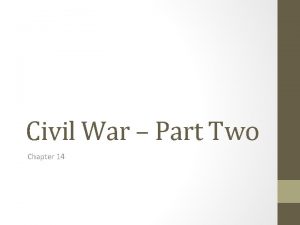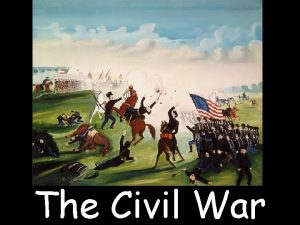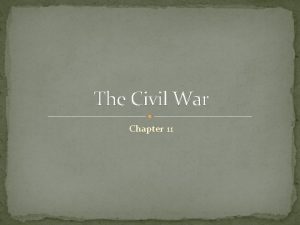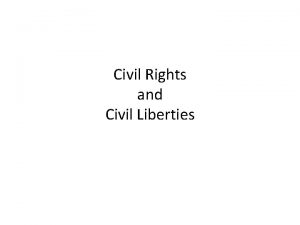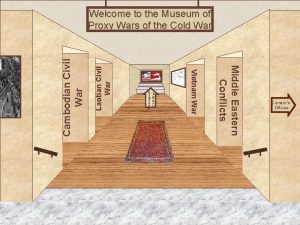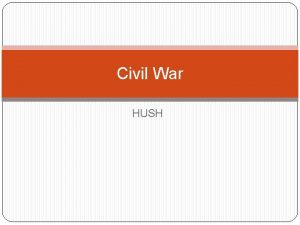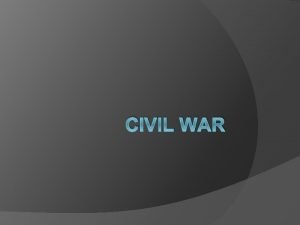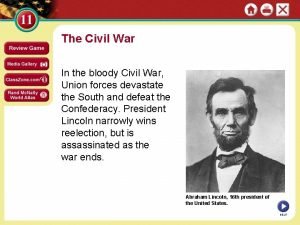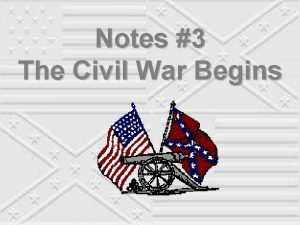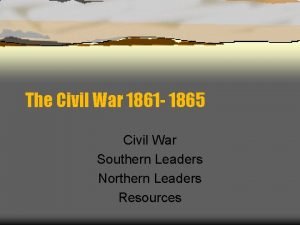The Civil War Chapter 11 The Civil War























































- Slides: 55

The Civil War Chapter 11

The Civil War

Early Civil War Battle’s Chart • Pod’s will create an early Civil War chart. The chart will help students keep track of information on three major early battles of the Civil war (Fort Sumter, Bull Run, and Antietam). • Students should collect information on the dates of the battle, where the battle was located, who won the battle, major generals or commanders involved, 1 informative and interesting fact on the battle, an Illustration, and why the battle is significant. • Pod’s will use the class laptops, their own electronic devices, and textbook to find information to fill out their chart.

What happens after Fort Sumter? • Lincoln calls for 75, 000 volunteers to serve for 3 months. Overwhelming response • Virginia Secedes: devastating for Union. Most populous and industrialized Southern State • In May Arkansas, Tennessee, and North Carolina Secede • Western Virginia counties secede from Virginia stay with the Union. These counties in 1863 get admitted into Union as West Virginia.

North vs. South in 1861 North South Advantages ? ? Disadvantages ? ?

Rating the North & the South

Slave/Free States Population, 1861

Railroad Lines, 1860

Resources: North & the South

The Union & Confederacy in 1861

Men Present for Duty in the Civil War

Soldiers’ Occupations: North/South Combined

Overview of the North’s Civil War Strategy: “Anaconda” Plan 1. Blockade the coast 2. Capture Confederate Capital---Richmond 3. Capture/Control the Mississippi River-thus splitting the Confederacy into two.

The “Anaconda” Plan

New Technologies in War • Invention of the rifle, deadly because it allowed soldiers to fire more quickly and with greater accuracy than old muskets. • Invention of the minie ball, a soft lead bullet that was more destructive than earlier bullets. • These two combined for mass destruction in frontal infantry attacks

Ironclad Ships • Could splinter wooden ships, withstand cannon fire, and resist burning. • Monitor (Union) vs Merrimack (Confederacy) first battle between ironclad ships changed the course of naval history.

Merrimack v Monitor

Battle of Bull Run (1 st Manassas) July, 1861 • 1 st Major Battle of the War • Both sides had to prepare for long war

Battle of Antietam “Bloodiest Single Day of the War” September 17, 1862 After this Battle, Lincoln issued the Emancipation Proclamation 23, 000 casualties

Mc. Clellan: I Can Do It All!

General George Mc. Clellan • Appointed to lead Union army after Union defeat at Bull Run. • Army of the Potomac • Extremely Cautious military tactician. After five months of training and army of 120, 000 he insisted he could not move on Richmond till he commanded an army of 270, 000. • Battle of Antietam: Mc. Clellan’s army against Lee’s in the bloodiest single day battle in United States history. • After the battle Mc. Clellan chose not to pursue Confederate army into their territory. President Lincoln would then fire Mc. Clellan over this overly cautious decision and failure to win the battle decisively

Diplomatic Relations with Great Britain • Britain no longer dependent on Southern Cotton. They were using Egyptian and Indian cotton. Did however become dependent on Northern Wheat and Corn. • Confederate govt sent two diplomats( John Slidell and James Mason) to Great Britain and France in attempt to gain support for their cause. • “The Trent Affair”: the two diplomats were on aboard the British merchant ship the Trent. It was stopped by an American warship and the two men were arrested. • Great Britain is outraged puts 8, 000 troops on Canadian border. Lincoln orders the two men to be released. Crisis avoided.

Emancipation Proclamation • • • Lincoln used his powers as commander-in-chief Freed the slaves in the states that were still in rebellion Keep France and Britain out of the War.

Emancipation Proclamation • Given January 1, 1863 • Applied only to slaves in the Confederacy. (Not to slave states who had not seceded) • Not much of a practical effect, but had symbolic importance. Gave the war a moral purpose • Allowed for free blacks in the North to enlist in the Union army.

Reactions to Emancipation Proclamation • Not all in the North in favor of it. • Democrats claimed it would only prolong the war • Confederates reacted with outrage • Jefferson Davis called it “the most execrable measure recorded in the history of guilty man” • After the Emancipation Proclamation both sides knew there would be no compromise. If the Confederacy lost the slave holding society would perish.

African-American Recruiting Poster

The Famous 54 th Massachusetts • Most famous black regiment of the Civil War

Bellwork Review Questions 1. Describe the battles of Antietam, Fort Sumter, and Bull Run. 2. What was the Anaconda Plan? What were its three parts? Who created it? 3. What was the Trent Affair? 4. Describe the impact of the Emancipation Proclamation?

Political Problems in North and South • Sympathizers in both countries • Lincoln suspends habeas corpus in Maryland in response to a Baltimore mob attacking union soldiers. (he did this later in other border states) • 13, 000 confederate sympathizers arrested and held without trial • Chief Justice Taney declared Lincoln had gone beyond his constitutional powers. Lincoln ignored this ruling. • Lincoln’s wartime actions set precedent for future presidents

Political Problems in the North and South • Copperheads: Northern Democrats who advocated for peace with the Confederates. • Desertion of soldiers • Conscription: A draft law that would force certain members of both North and South to serve in their respective armies. • First Confederacy draft law was white men 18 -35 (1864 law changed now 17 -50). • The North’s draft law white men 20 -45 (or pay $300 fee to avoid the draft)

New York City Draft Riots 1863 July 13 -16 • Large poor and immigrant population • Feared Southern blacks would take their jobs • Attacked the wealthy and African Americans • 100 dead by the time federal troops arrive

NYC Draft Riots, (July 13 -16, 1863)

The war’s impact on the economy • In general the war expanded the North’s economy and shattered the South’s. • Confederacy faced food shortages • Confederacy faced heavy inflation • The Union saw an industrial boom as a result of military manufacturing • Union became more reliant on machinery to make up for lost man power.

Northern Economy • 1863 Congress enacts first income tax law, a tax that take s a specified percentage of an individuals income. • Women replace men in the workforce, worked on farms even city and government jobs. Earned less money but many would remain workers after the war.

Inflation in the South Gu 4 l. Okc. IG 9 h. I 3

Civil War Medicine • United States Sanitary Commission: Government agency set up to improve hygienic conditions of army camps and to recruit/train nurses. • Clara Barton “the angel of the battlefield” • Sanitary commission helped improve the death rate among Union wounded when compared to previous wars.

Civil War medicine

Prisoner of war camps • Limited shelter, terrible hygiene, overcrowded, and limited food. • Andersonville, Georgia: Largest Confederate prison. 1/3 of its prisoners died. Prisoners drank from same stream that served as their sewer. • In total 15% of Northern prisoners died in Confederate prisons, while 12% of Confederate Prisoners died in North Prisons.

Andersonville

The Progress of War: 1861 -1865

The War in the West, 1863: Vicksburg 1. Turning point of the Western Theater. 2. Gave North Control of Miss. River

Siege of Vicksburg • City was shelled throughout the day • Ulysses S. Grant • Food supplies low in city, people ate dogs and mules • Forced CSA to surrender Vicksburg 7/4/1863 cut the country in two.

The Road to Gettysburg: 1863 1. Turning point in the Eastern Theater 2. The South never attacked the north again.

Battle of Gettysburg • Three day battle • Pickett’s Charge • Corpses everywhere, smell unbearable in July heat • General Lee took total responsibility for defeat at Gettysburg attempted to resign from his position of commander of CSA army.

Gettysburg Casualties

Gettysburg Address • November 19, 1863 • Ceremony to dedicate national cemetery • Speech by Lincoln was 2 minutes long, remade America. • Restatement of American democratic ideas

Sherman’s“ March to the Sea” through Georgia, 1864 1. Implemented total warfare—making civilians feel the pain of war. 2. His burning of Atlanta helped Lincoln win reelection.

William Sherman • Union General- Proponent of total war in the South. • “The fields were trampled down and the road was lined with carcasses of horses, hogs, and cattle that the invaders, unable either to consume or to carry away with them, had wantonly shot down, to starve out the people and prevent them from making their crops. The dwellings that were standing all showed signs of pillage”- Southern Civilian’s perspective

Sherman’s March

1864 Election Pres. Lincoln (R) George Mc. Clellan (D)

Election of 1864 • Lincoln in August of 1864: “I am going to be beaten, and unless some great change takes place, badly beaten. ” • Chose Andrew Johnson as VP ( a Democrat from Tennessee) • Union forces capture Mobile Bay in Alabama, Atlanta, and Northern Virginia.

Presidential Election Results: 1864 Includes absentee ballots of Union soldiers.

The Final Virginia Campaign: 1864 -1865 April 2, 1865 Richmond is abandoned.

Surrender at Appomattox April 9, 1865 • Generous terms for Lee and his men at Lincoln’s request. • Within two months all remaining Confederate forces collapsed

Casualties on Both Sides
 Why was the civil war the first modern war
Why was the civil war the first modern war Toward civil war lesson 3 secession and war
Toward civil war lesson 3 secession and war Chapter 16 the civil war begins worksheet answers
Chapter 16 the civil war begins worksheet answers The civil war begins chapter 11 section 1
The civil war begins chapter 11 section 1 Chapter 6 civil war and reconstruction
Chapter 6 civil war and reconstruction Chapter 21 the furnace of civil war
Chapter 21 the furnace of civil war Civil rights webquest
Civil rights webquest Chapter 30 the war to end war
Chapter 30 the war to end war Chapter 30 the war to end war
Chapter 30 the war to end war Causes of the civil war dbq
Causes of the civil war dbq Map of fort sumter
Map of fort sumter Causes of the civil war
Causes of the civil war What battle was the turning point of the civil war
What battle was the turning point of the civil war English civil wars timeline
English civil wars timeline What led to the civil war
What led to the civil war Civil war facts
Civil war facts Civil war staar questions
Civil war staar questions Civil war trifold
Civil war trifold Conclusion of the civil war
Conclusion of the civil war Civil war ppt and guided notes
Civil war ppt and guided notes Cotton diplomacy
Cotton diplomacy What led to the civil war
What led to the civil war Civil war trading cards project
Civil war trading cards project Unit 4: civil war and reconstruction
Unit 4: civil war and reconstruction What events led to the civil war
What events led to the civil war Civil war map sherman's march to the sea
Civil war map sherman's march to the sea The civil war affected the northern economy by
The civil war affected the northern economy by Civil war and reconstruction study guide
Civil war and reconstruction study guide Myjeopardy
Myjeopardy Civil war jeopardy review game
Civil war jeopardy review game Famous people in the civil war
Famous people in the civil war Civil war advantages and disadvantages chart
Civil war advantages and disadvantages chart Chinese civil war resumes
Chinese civil war resumes Civil war advantages and disadvantages chart
Civil war advantages and disadvantages chart What were the 4 main causes of the civil war
What were the 4 main causes of the civil war Tissues causes of civil war
Tissues causes of civil war Northwest ordinance lead to civil war
Northwest ordinance lead to civil war Civil war bell ringers
Civil war bell ringers The turning point of the civil war
The turning point of the civil war Vus 7b when did the civil war officially begin?
Vus 7b when did the civil war officially begin? American civil war battles map
American civil war battles map North and south states civil war
North and south states civil war What do you see in this picture
What do you see in this picture The civil war
The civil war Civil war battle project
Civil war battle project Civil war vocabulary list
Civil war vocabulary list What are the 3 main causes of the civil war
What are the 3 main causes of the civil war North and south states civil war
North and south states civil war Why did civil war break out in rome
Why did civil war break out in rome English civil war mind map
English civil war mind map The civil war the fighting escalates
The civil war the fighting escalates How did the union name battles
How did the union name battles Robert e. lee and ulysses s grant venn diagram
Robert e. lee and ulysses s grant venn diagram Who
Who America civil war
America civil war Civil war usa
Civil war usa
